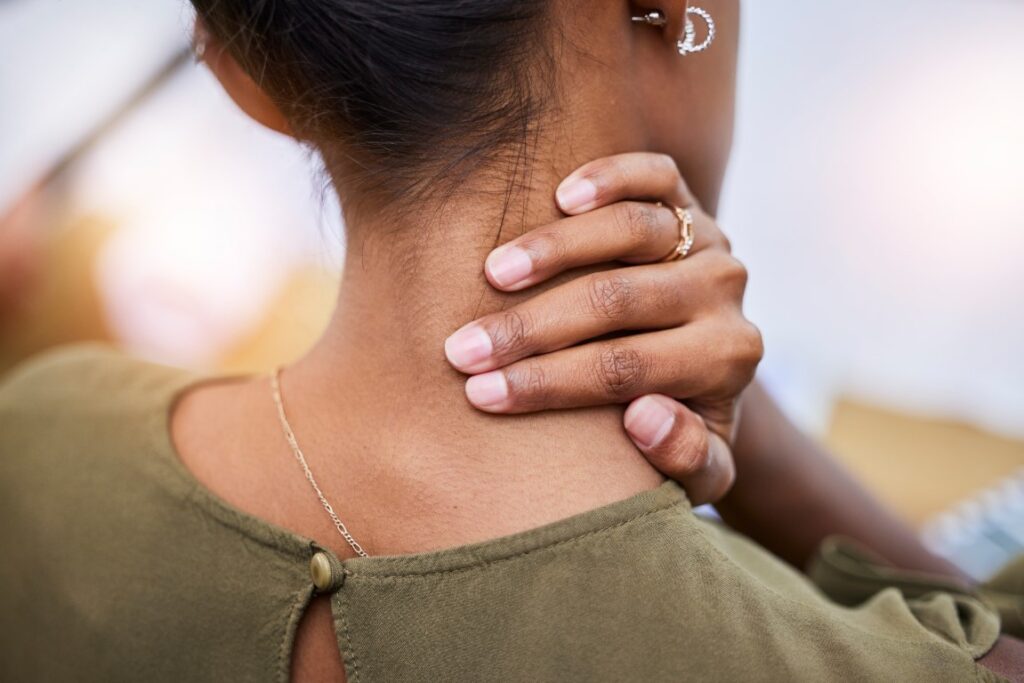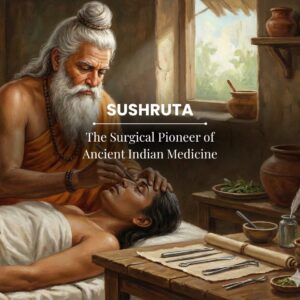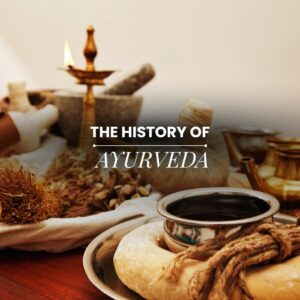Your shoulder joint may hurt and become stiff if you have frozen shoulder. The main reason for frozen shoulder is a sedentary lifestyle and lack of emphasis on physical activity. It usually occurs between the ages of 40 and 60, and it affects women more frequently than males. Therefore, it is important to know the effective frozen shoulder Ayurvedic treatment.
What is a Frozen Shoulder?
Frozen shoulder, also known as adhesive capsulitis, is a condition that causes discomfort and stiffness in the shoulder joint and makes movement difficult.
Common Symptoms of Frozen Shoulder
Frozen shoulder usually occurs gradually in three stages.
- Freezing stage: The shoulder becomes painful to move, and its range of motion is restricted. The duration of this phase is two to nine months.
- Frozen stage: This stage may be less painful. The shoulder becomes stiff and as a result, it becomes difficult to perform everyday tasks and activities. The duration of this phase is two to six months.
- Thawing stage (recovery): In this stage, the ability to move the shoulder starts improving. This phase lasts from five to twenty-four months.
Causes of Frozen Shoulder as per Ayurveda
- Hormonal imbalance
- Certain medical conditions, such as diabetes, heart problems, thyroid and Parkinson’s disease

- Accumulation of Ama (Toxins) due to improper digestion and Vata imbalance
- Postural issues like repetitive strain on the shoulder joint and sedentary lifestyle
- Weak immune system
- Prolonged inactivity or immobilization of shoulder due to injury, illness, or surgery
Frozen Shoulder Ayurvedic Treatment
As per Ayurvedic text, Apabahuk can be compared to frozen shoulder due to the similar symptoms of the disease. Also, Apabahuka is considered to be a condition caused by the Vata dosha (Movement force) that mostly affects the shoulder joint (Amsa sandhi).
According to Ayurvedic text, when the Vata at the base of the shoulder (Ansha Mula) gets aggravated, it leads to exploitation and constriction of vessels. This condition of restricted movement of the shoulder joint is known as Avabahuka.
In modern medicine, NSAIDs and steroids are used to treat these conditions, but they have a lot of side effects and are not very effective.
In Ayurveda, there are various shoulder pain ayurvedic treatments available for Avabahuka, such as Siravedha, Agnikarma, Basti, Nasya karma, Snehana, Swedana and oral medications.
Additionally, the Ayurvedic treatment targets the root cause of the disease and aids in preventing recurrence. However, through a proper frozen shoulder Ayurvedic treatment, the patient can perform his routine tasks without hindrance.
Frozen Shoulder Ayurvedic Treatment at Vaidyaratnam Vrindavan Ayurveda Chikitsalayam
Vaidyaratnam Vrindavan Ayurveda Chikitsalayam carries with itself the legacy of Vaidyaratnam, Kerala, a trusted name in the field of Ayurveda. VVAC is located in Baddi, near Chandigarh.
We at VVAC, believe in a specialized personal touch with every patient contacting us for the treatment. Our specialized team of doctors, experts in 8 branches of Ayurveda called Asthavaidyan listen to you and give full time to discuss the symptoms and the proposed treatment plan. Further, we believe that every individual is unique, so a customized treatment protocol plan for you by our expert.
Not to miss that we have a collection of more than 100 rare herbs, 600 types of medicines, and a range of medicated oils formulated by Vaidyaratnam, Kerala.
The hospital is spread over 25 acres and the lush green landscape of the hospital campus is known for its therapeutic benefits.
We at VVAC treat patients with frozen shoulder systematically, creating a personalized treatment plan for each patient based on their unique symptoms and body type.
Panchkarma Therapies for Frozen Shoulder at VVAC
Ayurvedic Panchkarma therapies like Abhyanga (oil massage) and Basti (meditated enema) are very helpful in relieving frozen shoulder. Panchkarma helps to arrest the process of degeneration and helps in rejuvenation.
There are many Panchkarma therapies used for frozen shoulder at VVAC including:
- Abhyanga Therapy: The application of oil to the whole body or particular affected part followed by a massage in specific directions is well known by Abhyanga in Ayurveda. Further, the medicated oil gets absorbed by the skin, reaching particular Dhatu (tissues) that nourish, relax, and soften the tissues, and has tremendous benefits to the mind and body. Finally, Ayurvedic Abhyanga massage controls the Vata Dosha, the causative factor for pain.
- Patrapinda Sweda: Swedana therapy involves the application of heat to the entire body or affected area and thereby induces sweating to enable detoxification. Furthermore, this therapy is done using a heated pack of special herbal leaves like eranda, arka, nirgundi etc., known as Patrapinda sweda. It clears the blockage of microchannels and helps to relieve stiffness.
- Matra Basti: It is indicated in Vataja Vyadhi. Also, it promotes strength and helps in the proper evacuation of Mala and Mutra.
- Kati Basti: It involves placing a ring made of dough around the affected shoulder area and filling it with warm medicated oil. Hence, it provides localized relief from pain and stiffness, reduces inflammation, and strengthens the shoulder muscles.
- Nasya Karma: Nasya Karma is one of the primary treatments of Avabahuk. It is particularly recommended for diseases above the shoulder. Also, medicated oil is administered to the brain through Nasya therapy, which affects the entire body.
Herbs for Frozen Shoulder Ayurvedic Treatment
Herbal supplements are highly effective in relieving frozen shoulder. However, it is essential to consult your Ayurvedic doctor before using these supplements.
- Guggulu (Commiphora wightii)- Guggulu has an anti-inflammatory and peripheral analgesic activity which reduces muscle stiffness and improves the degree of movement.
- Nirgundi (Vitex negundo)– Nirgundi leaf extract helps inhibit prostaglandin synthesis which leads to promotion of anti-inflammatory and pain-suppressing actions.
- Shallaki (Boswellia serrata)- The resin of Shallaki has an anti-inflammatory property and is prescribed by our traditional healthcare system to alleviate pain. The boswellic acid or boswellin resinous exudation can be administered orally as well as applied locally to relieve inflammation associated frozen shoulder.
- Dashamoola: This unique concoction contains 10 incredible Ayurvedic herbal roots that have potent analgesic, pain-relieving, and anti-inflammatory properties. It helps to balance Vata Dosha and reduces pain.
Yoga to Relieve Frozen Shoulder Pain
Practicing therapies like Yoga and Pranayama can help balance Vata dosha.
- Anulom Viloma: Anuloma Viloma or alternate nostril breathing are very effective interventions in relieving frozen shoulder pain.
- Practicing Parsva Balasana ( Thread the Needle Pose), Garudasana Arms ( Eagle Arms), Gomukhasana (Cow Face Pose), Adho Mukha Svanasana (Downward-Facing Dog), and Uttana Shishosana to stretch the shoulders, arms, and upper back.
- Meditation: Stress, anxiety, and depression caused by chronic pain can complicate your frozen shoulder. Further, meditation can help relax tight muscles and reduce stress which helps in managing shoulder pain.
Course of Diet as Frozen Shoulder Ayurvedic Treatment
- Include seasonal fruits, vegetables, whole grains, and lean protein in your diet to reduce inflammation.
- Take food rich in fatty acids such as avocado, walnuts, and flaxseeds, they can help reduce pain and inflammation.
- Adequate water intake promotes adequate nutrient delivery and lubrication of joints.
- Warm, cooked foods like soups, stews, and porridges are easy to digest. Also, consume healthy fats like Ghee, sesame oil, or olive oil to lubricate joints.
- Ginger, turmeric, cumin, coriander, and fennel improves digestion and reduce inflammation internally. Additionally, as a part of ayurvedic treatment for Frozen Shoulder add Triphala, Ashwagandha, and Guggulu.
FAQs on Frozen Shoulder Ayurvedic Treatment
1. What should you avoid with a frozen shoulder?
Be careful not to sleep on the side with your affected shoulder. Likewise, avoid doing repetitive shoulder motions and avoid lifting and carrying loads that are too heavy for your shoulder to manage.
2. Can Ayurveda cure shoulder pain?
Frozen shoulder can be treated effectively with Ayurveda. With the help of Panchakarma therapy and internal medicines tailored to individual conditions frozen shoulder can be managed. The treatment helps reduce pain and swelling and increases the range of motion in joints.
3. Does heat help the frozen shoulder?
Before starting any shoulder exercises, first, warm up the area. The best way to accomplish this is to take a warm bath or shower for ten to fifteen minutes. You can also use a damp towel or moist heating pad that has been warmed in the microwave.
4. Which oil should be used for shoulder pain Ayurveda?
There are many oils combining various Ayurvedic herbs, such as Mahanarayan oil, Dashamool oil is often applied topically to increase blood circulation, ease tense muscles, and provide pain relief.
5. Is there a permanent cure for frozen shoulder?
Ayurvedic treatment aims to provide permanent relief from symptoms by eliminating the underlying root cause of the problem. The goal is to provide relief without any side effects.
6. Is Ayurvedic treatment for Frozen Shoulder safe for everyone?
The Frozen Shoulder ayurvedic treatment is safe for everyone as it uses natural herbs and therapies. However, it is important to consult with a qualified Ayurvedic doctor before starting any therapy to combat the pain associated with a frozen shoulder.







